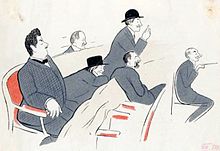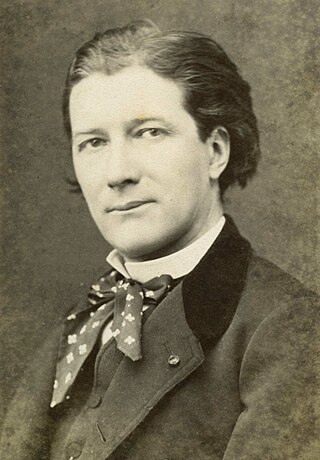
Victorien Sardou was a French dramatist. He is best remembered today for his development, along with Eugène Scribe, of the well-made play. He also wrote several plays that were made into popular 19th-century operas such as La Tosca (1887) on which Giacomo Puccini's opera Tosca (1900) is based, and Fédora (1882) and Madame Sans-Gêne (1893) that provided the subjects for the lyrical dramas Fedora (1898) and Madame Sans-Gêne (1915) by Umberto Giordano. His play Gismonda, from 1894, was also adapted into an opera of the same name by Henry Février.
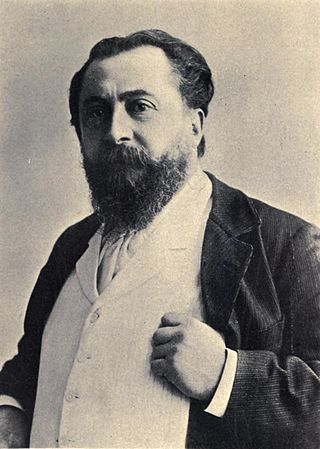
Catulle Mendès was a French poet and man of letters.

Alexandre Charles Lecocq was a French composer, known for his opérettes and opéras comiques. He became the most prominent successor to Jacques Offenbach in this sphere, and enjoyed considerable success in the 1870s and early 1880s, before the changing musical fashions of the late 19th century made his style of composition less popular. His few serious works include the opera Plutus (1886), which was not a success, and the ballet Le cygne (1899). His only piece to survive in the regular modern operatic repertory is his 1872 opéra comique La fille de Madame Angot. Others of his more than forty stage works receive occasional revivals.

Henry Brougham Farnie, often called H. B. Farnie, was a British librettist and adapter of French operettas and an author. Some of his English-language versions of operettas became record-setting hits on the London stage of the 1870s and 1880s, strongly competing with the Gilbert and Sullivan operas being played at the same time.

La fille de Madame Angot is an opéra comique in three acts by Charles Lecocq with words by Clairville, Paul Siraudin and Victor Koning. It was premiered in Brussels in December 1872 and soon became a success in Paris, London, New York and across continental Europe. Along with Robert Planquette's Les cloches de Corneville, La fille de Madame Angot was the most successful work of the French-language musical theatre in the last three decades of the 19th century, and outperformed other noted international hits such as H.M.S. Pinafore and Die Fledermaus.

Comte Émile de Najac was a French librettist. He was a prolific writer during the Second Empire and early part of the Third Republic, supplying plays and opéra comique librettos, many in one act.

The Théâtre des Folies-Dramatiques was a theatre in Paris in the 19th and 20th centuries. Opened first in 1832 in the site of the old Théâtre de l'Ambigu-Comique on the Boulevard du Temple, under Frédérick Lemaître it became a noted venue for the genre of mélodrame.

Michel Trempont was a Belgian operatic baritone whose repertoire extended from the 18th century to the creation of contemporary works. His brother was Pol Trempont (1923–2007), operatic tenor and one time director of the Théâtre de Mons.

Marguerite Macé-Montrouge, became a professional actress at the age of 14, and was an early member of Offenbach's troupe, before enjoying a long stage career in Paris and elsewhere.
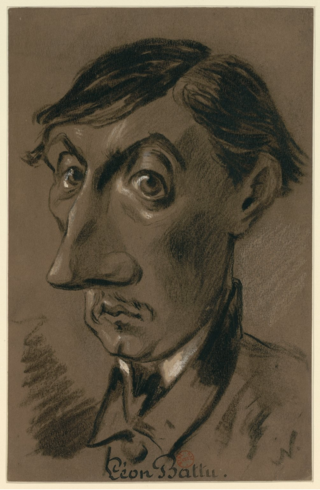
Léon Battu was a French dramatist, born 1829 in Paris, where he died on 22 November 1857.

Henri Charles Chivot was a French writer and playwright, mostly known as an operetta librettist.

Albert Millaud was a French journalist, writer and stage author, born in Paris, 13 January 1844, and died in the same city on 23 October 1892.
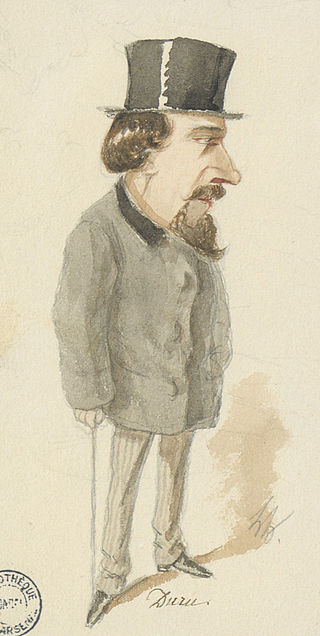
Henri Alfred Duru was a 19th-century French playwright and operetta librettist who collaborated on more than 40 librettos for the leading French composers of operetta: Hervé, Offenbach, Lecocq and Audran.

Fabrice Carré or Carré-Labrousse, real name Jules Fabrice, was a 19th-century French playwright, and librettist. The dramatist Fabrice Labrousse (1806-1876) was his grandson.
Marcel Auguste Antoine Cariven, was a French conductor, particularly associated with light music and with operetta.
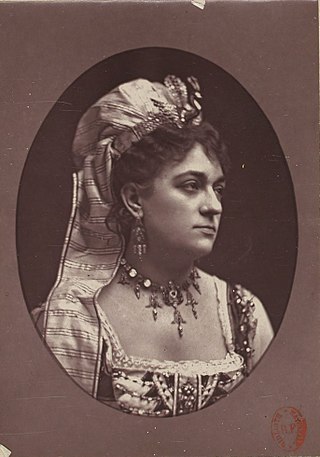
Anna Van Ghell was a Belgian singer who starred in numerous operettas in Paris. She was called Anna Vanghel or Vanghell in France.

Clément Lippacher (1850–1934) was a French composer and organist.

Kosiki is an opéra comique in three acts, with music by Charles Lecocq and words by William Busnach and Armand Liorat. It was first produced at the Théâtre de la Renaissance, Paris, on 18 October 1876, with a cast headed by Zulma Bouffar and Jean-François Berthelier. By the standards of Lecocq's biggest successes its initial run of 75 performances was a disappointment.

Maurice Lamy or M. Lamy was the stage name of the French actor and singer Maurice Castarède. He came from a theatrical family but began as a violinist before becoming an actor. Among the leading roles he created were Aristide in André Messager's Les p'tites Michu (1897), Loustot in Messager's Véronique (1898) and Le Taupier, the wizard, in Charles Lecocq's La Belle au bois dormant (1900).
